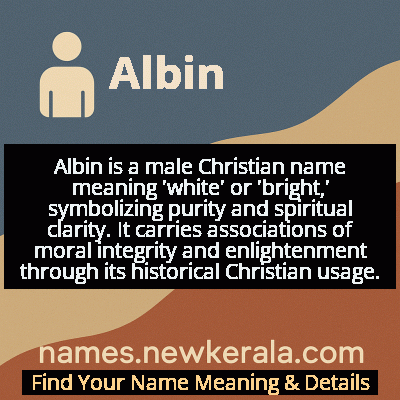Albin Name Meaning & Details
Origin, Popularity, Numerology Analysis & Name Meaning of Albin
Discover the origin, meaning, and cultural significance of the name ALBIN. Delve into its historical roots and explore the lasting impact it has had on communities and traditions.
Name
Albin
Gender
Male
Origin
Christian
Lucky Number
2
Meaning of the Name - Albin
Albin is a male Christian name meaning 'white' or 'bright,' symbolizing purity and spiritual clarity. It carries associations of moral integrity and enlightenment through its historical Christian usage.
Albin - Complete Numerology Analysis
Your Numerology Number
Based on Pythagorean Numerology System
Ruling Planet
Moon
Positive Nature
Diplomatic, friendly, artistic, empathetic.
Negative Traits
Over-sensitive, moody, indecisive, prone to self-pity.
Lucky Colours
Green, cream, white.
Lucky Days
Monday.
Lucky Stones
Pearl, moonstone.
Harmony Numbers
1, 3, 4.
Best Suited Professions
Diplomats, mediators, caregivers, artists.
What People Like About You
Cooperative spirit, friendliness, artistic talent.
Famous People Named Albin
Saint Albin of Angers
Christian Bishop and Saint
6th-century bishop known for piety, charity, and monastic foundations; venerated as saint
Albin Polasek
Sculptor and Educator
Renowned Czech-American sculptor and art educator at Chicago Art Institute
Albin Egger-Lienz
Painter
Influential Austrian painter known for monumental figurative works and social commentary
Albin Kurti
Politician
Current Prime Minister of Kosovo and prominent independence activist
Name Variations & International Equivalents
Click on blue names to explore their detailed meanings. Gray names with will be available soon.
Cultural & Historical Significance
Beyond its religious origins, Albin evolved differently across European cultures while maintaining its core meaning of 'white' or 'bright.' In Scandinavian countries, it became integrated into national naming traditions during the 19th-century romantic period, while in Central Europe it maintained stronger Catholic associations. The name's endurance across centuries demonstrates how Christian names can adapt to local cultures while preserving their original spiritual significance, making Albin a fascinating example of how naming traditions bridge religious, linguistic, and national boundaries.
Extended Personality Analysis
Individuals bearing the name Albin are typically associated with qualities of integrity, thoughtfulness, and quiet determination. The name's historical connection to Saint Albin suggests a personality inclined toward service, moral clarity, and compassionate leadership. Many Albins display a methodical approach to problem-solving and prefer to act based on careful consideration rather than impulse. Their perceived honesty and transparency often make them trusted confidants and reliable team members.
The 'white' meaning underlying the name frequently translates to personality traits such as purity of intention, straightforward communication, and ethical consistency. Albins often demonstrate strong principles and a sense of duty, whether in personal relationships or professional contexts. They tend to be perceptive observers who value depth in relationships and intellectual pursuits. While sometimes reserved in new situations, they typically form lasting bonds based on mutual respect and shared values, embodying the name's association with clarity and moral brightness in their interactions with others.
Modern Usage & Popularity
In contemporary naming practices, Albin maintains steady popularity across Northern and Central Europe, particularly in Sweden where it has ranked among the top 100 boys' names in recent years. The name appeals to modern parents seeking names with historical depth but contemporary feel, bridging traditional Christian heritage with modern simplicity. While less common in English-speaking countries, Albin has seen increased usage as globalization makes European names more accessible and desirable. Its current popularity reflects broader trends favoring names with clear meanings, international appeal, and religious significance without being overtly denominational. The name's moderate usage ensures it remains distinctive without being unfamiliar, striking a balance that many contemporary parents find appealing when choosing names with cultural substance.
Symbolic & Spiritual Meanings
Symbolically, Albin represents purity, illumination, and new beginnings through its fundamental meaning of 'white.' In Christian symbolism, white signifies baptismal innocence, spiritual cleansing, and the soul's purification. The name carries connotations of moral clarity and truth-seeking, suggesting an individual who serves as a beacon of integrity and ethical conduct. Beyond religious contexts, Albin symbolizes intellectual brightness and enlightenment, representing the pursuit of knowledge and understanding. The whiteness also connects to blank slates and fresh starts, making the name metaphorically associated with redemption, transformation, and the possibility of beginning anew. These layered symbolic meanings create a rich tapestry that has maintained the name's appeal across centuries and cultures.

